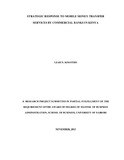| dc.contributor.author | Kimotho, Leah N | |
| dc.date.accessioned | 2013-11-21T11:21:54Z | |
| dc.date.available | 2013-11-21T11:21:54Z | |
| dc.date.issued | 2013-11 | |
| dc.identifier.citation | Master Of Business Administration (mba) Degree, School Of Business, University Of Nairobi, 2013 | en |
| dc.identifier.uri | http://erepository.uonbi.ac.ke:8080/xmlui/handle/123456789/59757 | |
| dc.description.abstract | Increased competition threatens the attractiveness of an industry and reduces the
profitability of the players. To succeed in the long term, organizations must compete
effectively and out perform their rivals in a dynamic environment. Kenyans have
embraced mobile money transfer services in masses due to the security, reliability,
affordability and convenience associated with mobile banking and cash transfer. The
business environment within which Kenyan commercial banks operates has therefore
been threatened by the new entrants offering money transfers services. The threat to the
industry cannot be ignored because the industry plays a significant role in our economy.
This study sought to establish the strategic response of commercial banks in Kenya to the
introduction of mobile money transfer services. This research study adopted descriptive
cross-sectional research design. The population of study consisted of all the 43
commercial banks that are dully registered with Central Bank of Kenya by 2013. The
study collected primary data from the managers of the commercial banks. The primary
data was collected using semi-structured questionnaires. The respondents included senior
and middle level managers who make strategic decisions in these commercial banks. The
questionnaires were administered using the drop-and-pick method. The filled
questionnaires containing the data were first edited then coded to facilitate statistical
analysis Data collected was analyzed through descriptive statistics and the findings
presented in form of frequency distribution tables, bar charts and pie charts. In the pursuit
of collecting data, the researcher experienced challenges such as lack of cooperation from
the banks which were unwilling to give information. The study found out that most of the
commercial banks had increased their budgetary allocation to counter competition from
mobile money transfer. Majority of the banks had adopted new technologies to counter
competition that had been posed by the mobile money transfer; introduced a wide ATM
network and also opened up more branches across the country to try reach more
customers. The study concludes that most of the commercial banks have adopted
strategies to mitigate the competition posed by mobile money transfer services. These
included adopting new technologies such as mobile banking through collaborating with
mobile/ telecommunication companies in effecting these services; online/internet banking
and more introduction of plastic money through credit cards. The study recommends that
commercial banks in Kenya must be in tune with its external environment. Banks also
need to adopt strategies such as forming strategic alliance with other financial services
providers. The banks also need to employ human resource strategies since lack of skilled
man power was established as a major factor that hinders innovativeness. | en |
| dc.language.iso | en | en |
| dc.publisher | University of Nairobi, | en |
| dc.title | Strategic response to mobile money transfer services by Commercial Banks in Kenya | en |
| dc.type | Thesis | en |
| local.publisher | School of business, | en |

